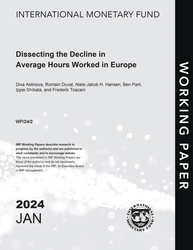
Dissecting the Decline in Average Hours Worked in Europe
Dissecting the Decline in Average Hours Worked in Europe
READ MORE...
Volume/Issue:
Volume 2024
Issue 002
Publication date: January 2024
ISBN: 9798400261183
$20.00
Add to Cart by clicking price of the language and format you'd like to purchase
Available Languages and Formats
| English |
Prices in red indicate formats that are not yet available but are forthcoming.
Topics covered in this book
This title contains information about the following subjects.
Click on a subject if you would like to see other titles with the same subjects.
Labor , Economics- Macroeconomics , Economics / General , Demography , hours worked , working hours , labor market , Europe , policy reform , worker level , scant evidence , summary statistics , full time worker , Labor markets , Women , Labor supply , Labor force participation
Summary
Three years after the COVID-19 crisis, employment and total hours worked in Europe fully recovered, but average hours per worker did not. We analyze the decline in average hours worked across European countries and find that (i) it is not cyclical but predominantly structural, extending a long-term trend that predates COVID-19, (ii) it mainly reflects reduced hours within worker groups, not a compositional shift towards lower-hours jobs and workers, (iii) men—particularly those with young children—and youth drive this drop, (iv) declines in actual hours match declines in desired hours. Policy reforms could help involuntary parttimers and women with young children raise their actual hours towards desired levels, but the aggregate impact on average hours would be limited to 0.5 to 1.5 percent. Overall, there is scant evidence of slack at the intensive margin in European labor markets, and the trend fall in average hours worked seems unlikely to reverse.
Copyright © 2010 - 2026
Powered by:
AIDC



